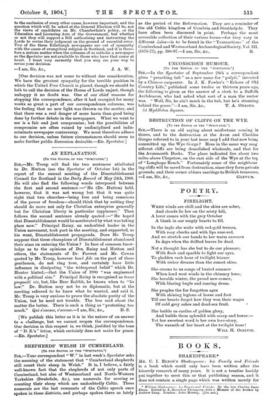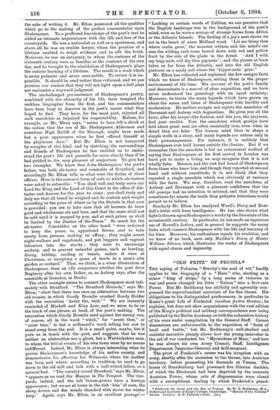SHAKESPEARE.* Mn. C. I. ELTON'S Shakespeare : his Family and
Friends is a book which could only have been written after the leisurely research of many years. It is not a treatise hastily put together to meet this or that publishing season, and it does not contain a single page which was written merely for
• William Shakespeare las Family and Friends. By the late Charles Isaac Elton. Edited by A. Hamilton Thompson, with a Memoir of the Author by Andrew Lang. London John Murray. [Ms. net.1
the sake of writing it. Mr. Elton possessed all the qualities which go to the making of the perfect commentator upon Shakespeare. To a profound knowledge of the poet's text he added an intimate acquaintance with the life and lore of the countryside. He was a naturalist as well as a sportsman, and above all, he was an erudite lawyer, whom the practice of a lifetime enabled to weigh evidence and to sift the truth. Moreover, he was an antiquary, to whom the customs of the sixteenth century were as familiar as the customs of his own day, and be brought to the elucidation of Shakespeare's plays the curious learning of a lifetime. The result is a work which is never pedantic and never over-subtle. To review it is im- possible. It should be read rather than criticised, and we can promise our readers that they will not light upon a dull page nor encounter a wayward judgment.
The unchallenged pre-eminence of Shakespeare's poetry, combined with the obscurity of his life, have tempted the reckless biographer from the first, and the commentators have been busy to discover in the poet's career what they hoped to find. They have, for the most part, rejected all such anecdotes as impaired his respectability. Malone, for example, as Mr. Elton says, "seems to have felt a shock at the notion that the son of Mr. Shakespeare, Alderman and sometime High Bailiff of the Borough, might have made but a poor appearance when be first offered himself at the playhouse door." But Mr. Elton is not hampered by scruples of this kind, and by sketching the surroundings and friends of Shakespeare he has enabled us to under- stand the poet's life and pursuits far more clearly than if he had yielded to the easy pleasure of conjecture. To give but two examples. We know that John Shakespeare, the poet's father, was both ale-taster and constable of Stratford, and accordingly Mr. Elton tells us what were the duties of these officers. Here is the common form of oath to which ale-tasters were asked to subscribe : "You shall well and truly serve our Lord the King and the Lord of this Court in the office of Ale- taster and Assizer for the year to come : you shall truly and duly see that all bread be weighed and do contain such weight according to the price of wheat as by the Statute in that case is provided : you are to take care that all brewers do brew good and wholesome ale and beer, and that the same shall not be sold until it is essayed by you, and at such prices as shall be limited by the Justice of the Peace." So much for the ale-taster. Constables, on the other hand, "were ordained to keep the peace, to apprehend felons, and to take surety from persons making an affray ; they might arrest night-walkers and vagabonds, and put beggars and vagrant labourers into the stocks ; they were to encourage archery, and to prevent unlawful games, such as bowling, dicing, tabling, carding or tennis, unless it were at Christmas, or excepting a game of bowls in a man's own garden or orchard." That, we think, is a wiser illustration of Shakespeare than an idle conjecture whether the poet drew Dogberry after his own father, or, as Aubrey says, after the constable at Grendon, in Bucks.
The other example seems to connect Shakespeare most inti- mately with Stratford. "The Stratford Records," says Mr.
Elton, "show that there was once an altercation between two old women, in which Goody Bromlie crushed Goody Holder with the execration Arent the, wich.' " We are instantly
reminded of Macbeth and King Lear, and we seem to be on
the track of one phrase, at least, of the poet's making. The execration which Goody Bromlie used against her enemy was, of course, all in the word "witch," for " arent thee," or " arint thee," is but a milkmaid's word, telling her cow to stand away from the pail. It is a small point, maybe, but it puts us in touch with the poet, and suggests that he was neither an abstraction nor a ghost, but a Warwickshire man, to whom the trivial events of his own town were by no means indifferent. Indeed, Mr. Elton is always interesting when he proves Shakespeare's knowledge of his native county, and demonstrates his affection for Wilmcote, where his mother
was born, and where, according to tradition, he used to go down to the old mill and talk with a half-witted fellow, or a natural fool. "The country round Stratford," says Mr. Elton, "appears as we read the Masque in The Tempest. The vine-
yards, indeed, and the tall broom-groves have a foreign appearance ; but we are at home in the rich 'less' of corn, the
sheep downs, and flat meads thatched with stover for winter keep." Again, says Mr. Elton, in an excellent passage.:—
"Looking at certain words of Caliban, we can perceive that the English landscape was in the background of the poet's mind, even as he wove a mirage of strange forms from Africa or the Atlantic Islands. The finding of a jay's nest shows we are in the heart of some Midland wood. Let me bring thee where crabs grow,' the monster whines, and the mind's eye sees the wilding crab trees bowed down with red and yellow fruit by the side of the glade in the forest. And I with my long nails will dig thee pig-nuts ' ; and the phrase at least takes us far from the Atlantic, and into the old English pastures on a sandy soil where the 'kipper-nuts' grew."
Mr. Elton has collected and explained the few meagre facts which we know of Shakespeare, setting them in the proper environment of the time. His account of the poet's family and descendants is a marvel of clear exposition, and we have never understood the genealogy with an equal certainty. Moreover, he treats the many legends which have grown up about the name and fame of Shakespeare with lucidity and moderation. He neither accepts nor rejects the anecdotes of Davenant and Aubrey with dogmatism. He gives you all the facts, after his lawyer-like fashion, and lets you, the juryman, find your verdict. Now the anecdotes which gossips have told about great men are often essentially true, even when in detail they are false. The human mind likes to shape a simple truth in a story, and many legends are untrue only in their picturesqueness. For instance, it is unlikely that Shakespeare ever held horses outside the theatre. But if we remember that the anecdote is but an ornamental method of saying that Shakespeare at his first arrival in London was hard put to make a living, we may recognise that it is not wholly false. Beeston and the rest had heard of Shakespeare from those who knew him, and though they reported at second band and without exactitude, it is not likely that they repeated a single anecdote which was obviously at variance with the facts. We may, therefore, read the anecdotes of Aubrey and Davenant with a pleasant confidence that the old gossips bad no intention to mislead, and that they were sometimes far nearer the truth than pedantic historians would permit us to believe.
Similarly Mr. Elton has analysed Ward's Diary and Dow- dell's letter with keen intelligence. He has also shown what light is thrown upon Shakespeare's works by the literature of the seventeenth century. In particular, he has made an ingenious use of Howell's Letters, and in general he suggests the many links which connect Shakespeare with the life and learning of his time. Moreover, his enthusiasm equals his erudition, and we know of no book, save only Madden's Diary of Master William Silence, which illustrates the works of Shakespeare with equal charm and ingenuity.











































 Previous page
Previous page